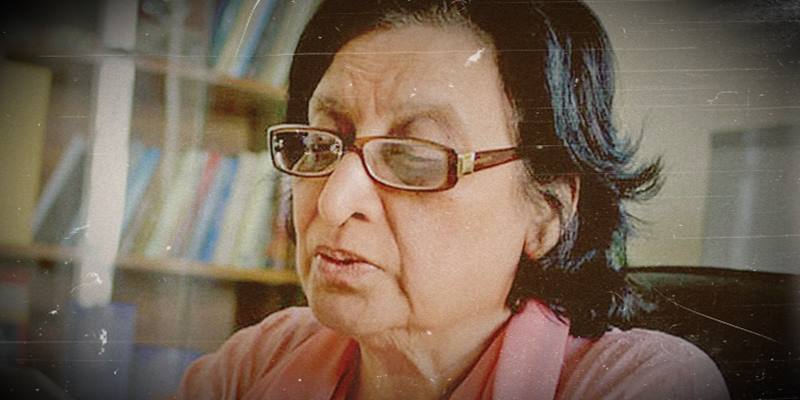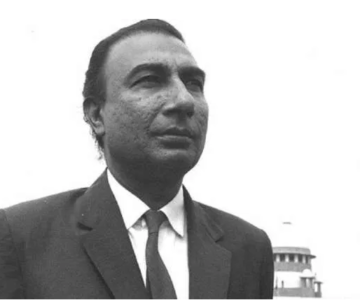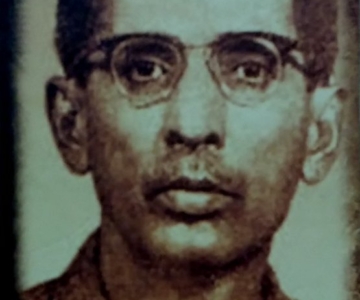Thanks to Isa Daudpota who sent me the text and the translated poems after he had heard Kamila Shamsie talk about her..
Fahmida Raiz, who graduated from Sindh University and married in 1965, has published several volumes of poetry. During the Martial Law regime she was editor and publisher of the magazine, Awaaz. In all, fourteen court cases of sedition were filed against the magazine, one of which (under section 114A) carried a death penalty. She escaped to India whilst on bail, with her husband and two children, where she lived for seven years. She worked as Poet-in-Residence at Jamia Millia, an Indian university, during this period.
She has translated Erich Fromme’s Fear of Freedom and Sheikh Ayaz’s poetry, from Sindhi into Urdu. Since the restoration of democracy she has returned to live in Pakistan and served as Director General of Pakistan’s National Book Council in Islamabad when Bhutto’s Pakistan People’s Party was in power.
Her book, The Body Lacerated, caused tremendous controversy because of its uninhibited and vigorous exploration of female sexuality. A woman in traditional Urdu poetry is a concept, not a person … an ideal with rosy cheeks, shining black eyes concealed shyly under long, dark eyelashes and a shapely swaying body. Fahmida rejects that passive virginal model in favour of a living, throbbing, vocal and passionate reality.
Her greatest contribution to literature is her recognition of the role of language in society. She has some interesting insights to offer, particularly with regard to the history of the Urdu language. She brings to her poetry her conviction that literary Urdu, too closely associated with the Persianised Imperial Court, had lost its nutritive sources as a living language of the people, by losing touch with its roots. Since the sustenance, relevance and contemporaneity of a language must derive from its living usage, not from books and papers, her argument is valid. Languages which cut off links with their grass-roots communities have been known to become emaciated, and do, invariably, die. She herself struggles in her language to restore its links with the usage of peasants and workers.
Riaz has moved away from the ghazal form but her poems resonate with music and her success as a lyricist is widely acknowledged.
Chadur and Char-diwari
What use is this black chadur to me?
A thousand mercies, why do you reward me with this?
I am not in mourning that I should wear this
To flag my grief to the world
I am not a disease that needs to be drowned in secret darkness
I am not a sinner nor a criminal
That I should stamp my forehead with its darkness
If you will not consider me too impudent
If you promise that you will spare my life
I beg to submit in all humility
O Master of men!
In your highness’ fragrant chambers
lies a dead body
Who knows how long it has been rotting?
It seeks pity from you
Sire, do be so kind
Do not give me this black chadur
With this black chadur cover the shroudless body
lying in your chamber
For the stench that emanates from this body
Walks buffed and breathless in every alleyway
Bangs her head on every doorframe
Covering her nakedness
Listen to her heart rending screams
Which raise strange spectre
That remain naked in spite of their chadur.
Who are they ? You must know them ,Sire.
Your highness must recognise them
These are the hand – maidens
The hostages who are halal for the night
With the breath of morning they become homeless
They are the slaves who are above
The half-share of inheritance for your
Highness’s off-spring.
These are the Bibis
Who wait to fulfill their vows of marriage
In turn, as they stand , row upon row
They are the maidens,
On whose heads , when your highness laid a hand
of paternal affection,
The blood of their innocent youth stained the
whiteness of your beard with red
In your fragrant chamber , tears of blood,
life itself has shed
Where this carcass has lain
For long centuries, this body spectacle of the murder
of humanity.
Bring this show to an end now
Sire, cover it up now
Not I, but you need this chadur now.
For my person is not merely a symbol of your lust:
Across the highways of life , sparkles my intelligence
If a bead of sweat sparkles on the earth’s brow it is
my diligence.
These four walls , this chadur I wish upon the
rotting carcass.
In the open air, her sails flapping , races ahead
my ship.
I am the companion of the New Adam
Who has earned my self-assured love.
– [translated from urdu by Rukhsana Ahmed]
She Is a Woman Impure
She is a woman impure
Imprisoned by her flowing blood
In a cycle of months and years.
Consumed by her fiery lust,
In search of her own desire,
This mistress of the devil
Followed his footsteps
Into a destination obscure
Unmarked, unmapped before
That union of light and fire
Impossible to find
In the heat of her simmering passion
Her breasts have ripped.
By each thorn on the wayside
Every membrane of her body ripped
No veil of shame conceals her body
No trace it bears of sanctity.
But, O Ruler of lands and oceans
Who has seen this before?
Everywhere your command is supreme
Except over this woman impure
No prayer crosses her lips
No humility touches her brow



